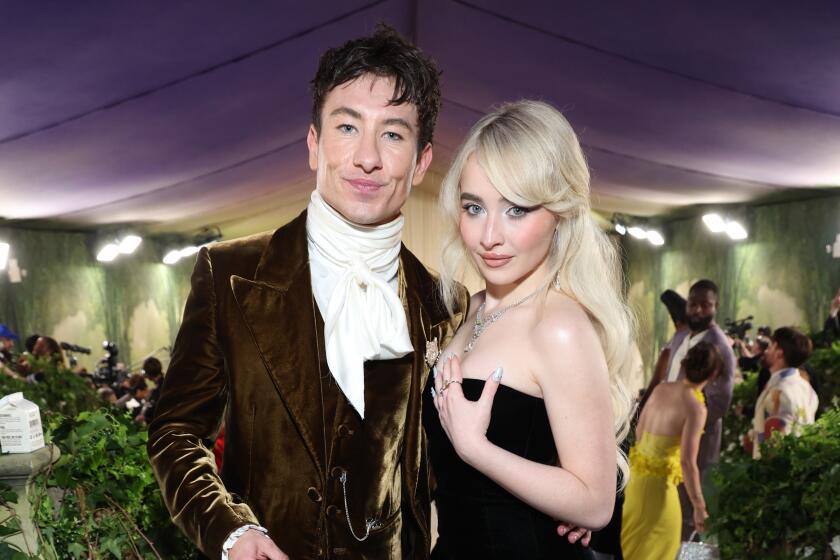Maverick Women Come Out Kickin’ : Victoria Williams : Misunderstood in La., Appreciated in L.A.
- Share via
Ten years ago, at a time when “Women in Rock” stories were still trumpeting the likes of Grace Slick, Heart and Linda McCartney, a revolution was getting under way in Los Angeles.
On the then-growing L.A. club scene, it was hard not to notice that--especially compared to certain Eastern burgs--a disproportionate number of those at the forefront of this city’s scene were charismatic, gutsy, mercurial women: X’s Exene Cervenka, the Motels’ Martha Davis, the Go-Go’s. . . .
Come late 1987, and the scene is far more scattered and factional, the pickings more diverse. Country and folk bills peacefully co-exist in the same clubs as rock shows, with a greatly overlapping audience.
Out of all that it shouldn’t be much of a surprise that the year’s three most accomplished vinyl debuts in those respective fields have all come from maverick L.A. women: ex-Texan Rosie Flores, ex-Louisianian Victoria Williams and home girl Johnette Napolitano of Concrete Blonde. None of them is the girl next door. None of them is Nancy Wilson, either. Calling Robert Altman: Do we have a trio for you. . . .
Remember the scene from “Singin’ in the Rain” where the lovely silent-movie star is finally heard to speak, breaking all preconceptions, with immediate and disastrous consequences for her career?
That’s what comes to mind when you hear the striking-looking, Southern-accented Victoria Williams first open her mouth, but the unusual things that come out are potentially career making, not breaking. As both singer and songwriter, she’s a true American one-of-a-kind.
“Do you think I sound funny singing?” asks the Louisiana native, earnestly, leaning over a pad on which she’s sketched some of the other patrons in a downtown working-class sandwich shop. “Everybody says that in their articles, that I have such a weird voice. I think I just write songs in weird keys for me or something. I’ve got to write some songs that I can sing prettier on.”
But Williams’ voice is indeed already pretty--and, yes, maybe a little “funny” at times, too. Williams might best be described as a cross between Dolly Parton, Jonathan Richman and Rickie Lee Jones. But then again, Williams is probably best not described at all. She begs to be experienced .
“Happy Come Home,” her first album on Geffen Records, is a charmer of a debut--all amusing, sad and thoughtful, with her high, cheerful warble providing the voice of informed innocence.
Thematically, there are lots of animals and idyllic Southern summer days. But if Van Dyke Parks’ bright string arrangements occasionally add a Disney-esque flair, it’s still a long way from “Mr. Rogers’ Neighborhood.” The animals tend to run away from home, or become extinct, or make small-talk about man’s inhumanity to man.
The small-town world of “Happy Come Home” seems far removed from the Los Angeles where Williams resides with her husband of several years, singer/songwriter Peter Case. But she’s found much more of an “open-minded” audience here than there was back home in the countryside just outside Shreveport.
“I was always misunderstood in Louisiana,” said Williams, “and a lot of the things I could appreciate there wouldn’t be things that other people could appreciate necessarily. And they would look at me like I was a kook for appreciating certain things. . . .
“I know that God has pulled me out of the dungeon. I’d probably be dead if it wasn’t for God. There was a time when I strayed pretty far, was off into drugs and all sorts of stuff like that pretty bad.
“I had this experience back in Shreveport that was almost like a revelation in the middle of the night, and all these Scriptures came to me that were probably planted from my childhood. And I said, ‘I’ve got to leave here,’ and I packed up my bags and just left and came out here.”
Once in Los Angeles, she slept on friends’ floors and took the bus each week to Watts to visit R&B; singer Johnny Otis’ church--”an except-for-me black church,” she said with a smile. This is also the church where she and Case were married three years ago.
Williams isn’t the only iconoclast in her family.
“My mother went to see ‘Indiana Jones and the Temple of Doom.’ My sister told me that in the middle of the movie, my mother stood up in the middle of the theater and said, ‘How can you sit here and watch this kind of filth?’ She started crying. . . . It was so typical, I would think, because my parents don’t go to the movies or anything and she was shocked. She paints pictures, and the way she sees things is different. . . .
“In a way, though, I was kind of proud of my mother when I heard that story. Because I think so many people sit there and take what they’re handed, you know? Even though it’s just corroding your soul.”
So what kind of movie would Mrs. Williams like?
“She’d like your basic ‘It’s a Wonderful Life,’ ” said Victoria, adding, “I’d like that too.”
More to Read
The biggest entertainment stories
Get our big stories about Hollywood, film, television, music, arts, culture and more right in your inbox as soon as they publish.
You may occasionally receive promotional content from the Los Angeles Times.










